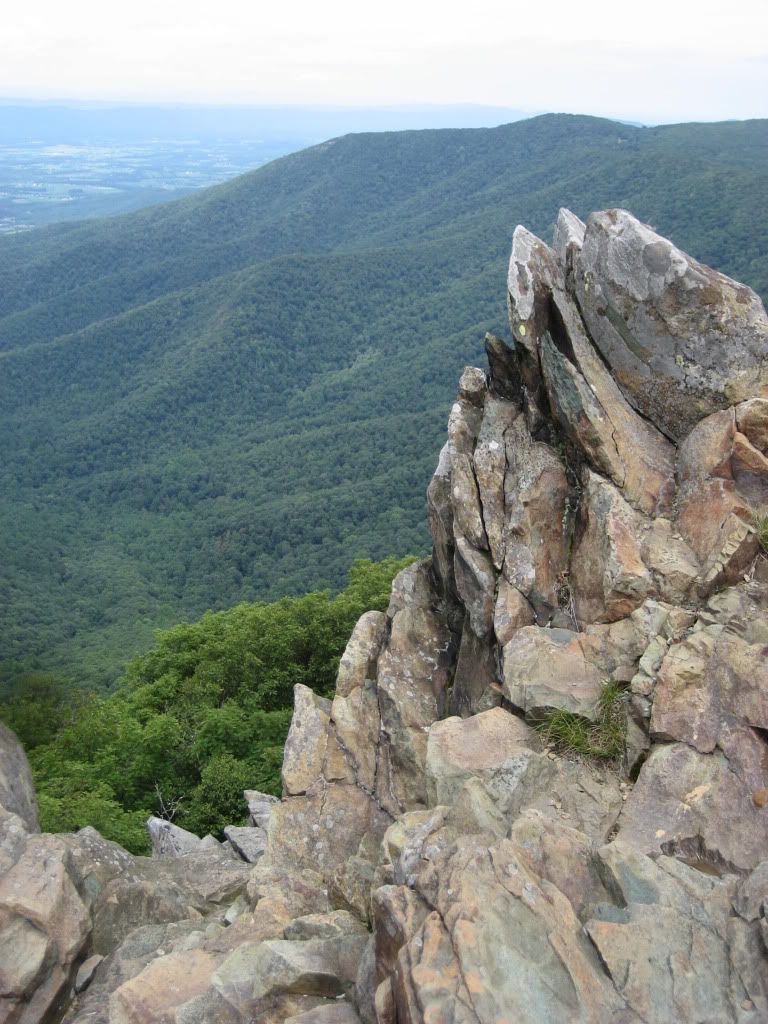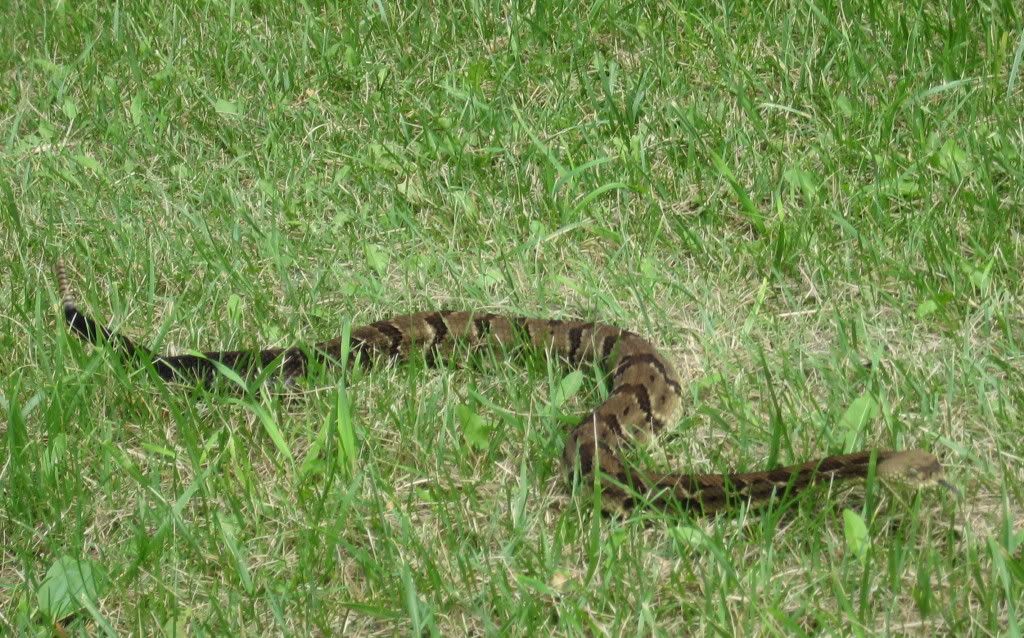“I adapt to any and all situations; that’s why they call me the pimp of the nation.” –Kid Rock
Perfection isn’t rare when you’re easily pleased like me. Any trip to Shenandoah National Park, with all its flora, fauna and spectacular views from Skyline Drive, defines a perfect summer weekend. Laura and I hadn’t been to the park since October, and when other plans fell through on a late July weekend, we jumped at the chance to do an overnighter. Laura said she was counting on plenty of bears and blackberries, and I went to bed Friday night with the camping bin packed, and visions of wild blackberry pancakes sweetening last moments before sleep.
And I woke up at three in the morning, miserable. My seasonal allergies (April through October) are so severe that I sometimes can’t tell whether it’s allergies or swine flu. I’ll spare the details, but symptoms persisted through morning, and when we hit the road, I was feeling anything but perfect. Even a fresh-from-the-hot-grease, apple cider donut from Apple House couldn’t fully elevate my spirits.
Still, I was so happy to enter the park at Front Royal and feel the slight cooling from elevation as we wound our way up Skyline. It was even hazier than usual, humid and in the 90s in the lowlands. But a relatively cool spring with plenty of rain had all the greens full and lush, the roadsides thick with wild bee balm, black eyed susans, tiger lilies, coreopsis, yarrow.
We made it to Mathews Arm campground ahead of noon and found a newly vacant, densely wooded site. We set up our small tent, the REI Half Dome, mostly mesh and great for warm summer nights under the stars. Camp made, we entered the brush. Wild blueberry bushes abounded, but the berries were all green. Firewood, however, did not abound. I spotted two logs with potential, and we had at them with our tip-broken handsaw. And man, was it hot. By the time we’d cut two logs, we were both sweating like boxers in the tenth round. Much as we like the manual labor and getting stuff for free, we were actually going to have to buy wood. “We should’ve replaced the saw,” Laura noted. And so began the list of things we should have brought but didn’t, including:
Can opener (had to hack into can with knife)
Eggs (had to buy)
Syrup (went without)
Fruits, vegetables (to cut the sausages and starches)
Some form of dessert (had no s’mores, no hobo pies)
Food for two lunches (had only dinner, breakfast)
Small backpack for hiking
Change of underwear for next day
While Laura drove up to Elkwallow to buy wood, I lay down in the tent to try and recover from the bad night’s sleep and heat stroke. When she returned, we threw a bottle of water into her big backpack and set off on a hike to Overall Run Falls, the highest falls in the park at 93’. Let’s say this was our sixth time camping at Shenandoah – we’ve attempted to find the Overall Run Falls at least three times before and failed. But this time I got a map with explicit instructions from a ranger, each turn highlighted, additional notes written in. And off we went, into the humid woods and up, up, up some rocky ridges. The hike got long; we heard no trickling water. Doubts arose. By the time we figured out where we’d gone wrong, we’d made one big strenuous circle, not to the falls but to the parking lot at the bottom of the park. I went ahead and cried a little.
But such sorrows can be assuaged with a cold beer and a good fire, so back at the site, we produced both. A deeper look in the woods brought forth plenty of kindling, what you need when the fire is young, and we settled around it, feeding it, listening to the hiss and crackle. It was burning perfectly. Ice cold Budweiser made a perfect thirst quencher. But Laura had her eye on some fluffy, rolling clouds. “Should we put the fly on the tent?” she wondered, and I said, no way, that it wasn’t going to rain. And it was as if my words drew the vapors straight down from the sky. Suddenly we weren’t beneath the clouds but within them and we got good and drenched getting that fly on the tent in time to keep our gear dry. We sat out the cloudburst in the car. The fire was intact when we emerged because I’d put down the grate and stacked wood over it. It was nothing to get it raging again.
Luckily, we’d gotten our rain shelter back from Kyoko and Jason, and they’d taken excellent care of it. It’s basically a large tarp with a center pole and four corner poles, and the picture on its packaging makes it look neat, sturdy and easy to assemble. In fact, it never worked as intended, and setting it up is always an exercise in cooperation and improvisation, meaning an awful lot of cussing takes place while ropes get tied to trees, and the flimsy poles bend under stress. I was shoving the center pole (and its pot-lid topper – another jimmy-fix) up toward the sky when the next storm split open directly above me and I left the pole to the lightning and ran screaming toward the car.
But a funny thing happened the next time the rain cleared, afternoon sun drawing steam from pavement and perfumey milkweeds. Just as we got the shelter worked out and discovered with glee that the Half Dome’s floor was still dry as a bone, our neighbors began to pack up all their wet tents and head out. People were giving up.
“Hah! Quitters!”
“Yeah; wow, some people are so soft-core. This isn’t even too bad.”
“No, not too bad at all.” We got awfully superior about our coping abilities.
So we poured one shot in honor of the rain shelter, under which it was possible to remain outdoors on a summer night of fickle weather. We cooked chilidogs and campfire potatoes, dousing the hot, tender potatoes in chili and shredded cheddar. Oh, and the salty sauciness did a damp body good. We even saw some stars before we slept, though storms rolled through until morning.
But what a bell-clear morning it was. Laura made a huge stack of moist, sweet pancakes, Bob Evans links and scrambled eggs. With all that fuel to run, we decided to have a perfect Sunday, to make up for all of Saturday’s foibles. Forget damned Overall Run Falls, we drove south on Skyline to the Hawksbill Mountain Trail. It, too, had its superlative feature – at 4050’, it’s the highest summit in the park. And it was a lovely hike, perfectly steep and taxing for the first mile and a half. At the summit, there’s a 360 degree view from an overlook called Byrd’s Nest, the craggy, exposed summit rock contrasting with the smoother lines of surrounding Appalachia, all verdant after the night’s rain. I lay on a ridge, rock disappearing beneath me. The rock was sun-warm, the wind was cool, humidity lifted. This was the reward, and I felt like I’d earned it, not just by my legs but by perseverance.

We took a longer route back to the trailhead, hiking part of the Appalachian Trail along a scenic ridge. When we came down from the mountain and headed back up Skyline homeward, we finally saw some bears, one single and one with a cub. Bears are easy to spot on Skyline Drive, not just because their solid blackness stands out, but because traffic in both directions backs up so folks can get a glimpse and maybe a photo. So when we ran up on such a traffic jam with no big black beast in sight, we were puzzled. I rolled down the window and a man walking toward me yelled “Snake!”, pointing down. A few feet from the car, it slithered through the grass, stretched long, its rattle raised in warning. Crotalus horridus, the timber rattler, highly venomous but relatively non-aggressive, it was the first rattlesnake I’ve ever seen in the wild.

We all need places where we go to re-create ourselves, where we find respite, refreshment, renewal. I know that sleeping on the ground among deadly creatures doesn’t do it for everybody, but it does it for me. My yoga instructor always asks, “What did you experience on the mat that you can take with you off of the mat?” I ask the same of camping trips: what did I discover in the woods that I can take out of the woods with me? The desire to re-create is a quest, after all. And when you know you love a place, and you go to it with gladness, with expectation, with an open heart, you want it to be perfect. What if it isn’t?
Chances are, there will come times when it won’t be. And I don’t want to summarize with some Sally Sunshine platitude, the old “best-way-out-is-through” business. (If the rain had never let up, perseverance would look like the wrong decision.) But I’ve never been let down by my best efforts to be patient within a situation, by using whatever I’ve got to make the most of it. When I’m camping, I’m determined to have a good time, whatever the conditions, so I’ve learned to cuss the rain tarp into functionality, to protect a fire so it can burn long, to laugh off the storms with a beer and some hot nourishment. What parallels can I draw between the realities of camping and daily realities? If so much depends on attitude, I figure I’m better off betting that perseverance brings unexpected rewards.
